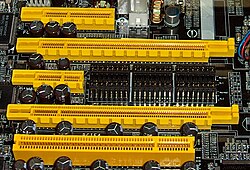
Back Rekenaarbus Afrikaans مسرى (حوسبة) Arabic Şin (kompüter) Azerbaijani Камп’ютарная шына Byelorussian Шина (компютри) Bulgarian বাস (কম্পিউটার) Bengali/Bangla Bus stlennegel Breton Sabirnica BS Bus (informàtica) Catalan تێپەڕگەی کۆمپیوتەر CKB

In computer architecture, a bus (historically also called a data highway[1] or databus) is a communication system that transfers data between components inside a computer or between computers.[2] It encompasses both hardware (e.g., wires, optical fiber) and software, including communication protocols.[3] At its core, a bus is a shared physical pathway, typically composed of wires, traces on a circuit board, or busbars, that allows multiple devices to communicate. To prevent conflicts and ensure orderly data exchange, buses rely on a communication protocol to manage which device can transmit data at a given time.
Buses are categorized based on their role, such as system buses (also known as internal buses, internal data buses, or memory buses) connecting the CPU and memory. Expansion buses, also called peripheral buses, extend the system to connect additional devices, including peripherals. Examples of widely used buses include PCI Express (PCIe) for high-speed internal connections and Universal Serial Bus (USB) for connecting external devices.
Modern buses utilize both parallel and serial communication, employing advanced encoding methods to maximize speed and efficiency. Features such as direct memory access (DMA) further enhance performance by allowing data transfers directly between devices and memory without requiring CPU intervention.
- ^ Hollingdale, Stuart H. (1958-09-19). Session 14. Data Processing. Applications of Computers, University of Nottingham 15–19 September 1958.
- ^ Clifton, Carl (1986-09-19). What Every Engineer Should Know about Data Communications. CRC Press. p. 27. ISBN 9780824775667. Archived from the original on 2018-01-17.
The internal computer bus is a parallel transmission scheme; within the computer....
- ^ "bus Definition from PC Magazine Encyclopedia". pcmag.com. 2014-05-29. Archived from the original on 2015-02-07. Retrieved 2014-06-21.
© MMXXIII Rich X Search. We shall prevail. All rights reserved. Rich X Search